Social Work Assessment Report: Empowering Peter Jones, ABC Centre
VerifiedAdded on 2023/01/20
|11
|2770
|34
Report
AI Summary
This report presents an empowering assessment of Peter Jones, a client of the ABC Community Centre. The assessment utilizes a strengths-based perspective and ecosystem theory to analyze Peter's current situation, considering his mental and physical health, social connections, economic status, and cultural heritage. The report identifies his strengths, including motivation and a desire to improve his life, while also acknowledging challenges like depression, anxiety, and financial instability. The assessment incorporates intersectionality to understand the impact of multiple social factors on Peter's life, particularly as an Aboriginal individual. It outlines his needs, emphasizing the need for social, emotional, and financial support, and justifies these needs based on ecosystem theory and intersectionality. The report also discusses the values and ethics guiding the assessment, referencing the NASW Code of Ethics, and concludes with a summary of the assessment and recommendations for intervention.
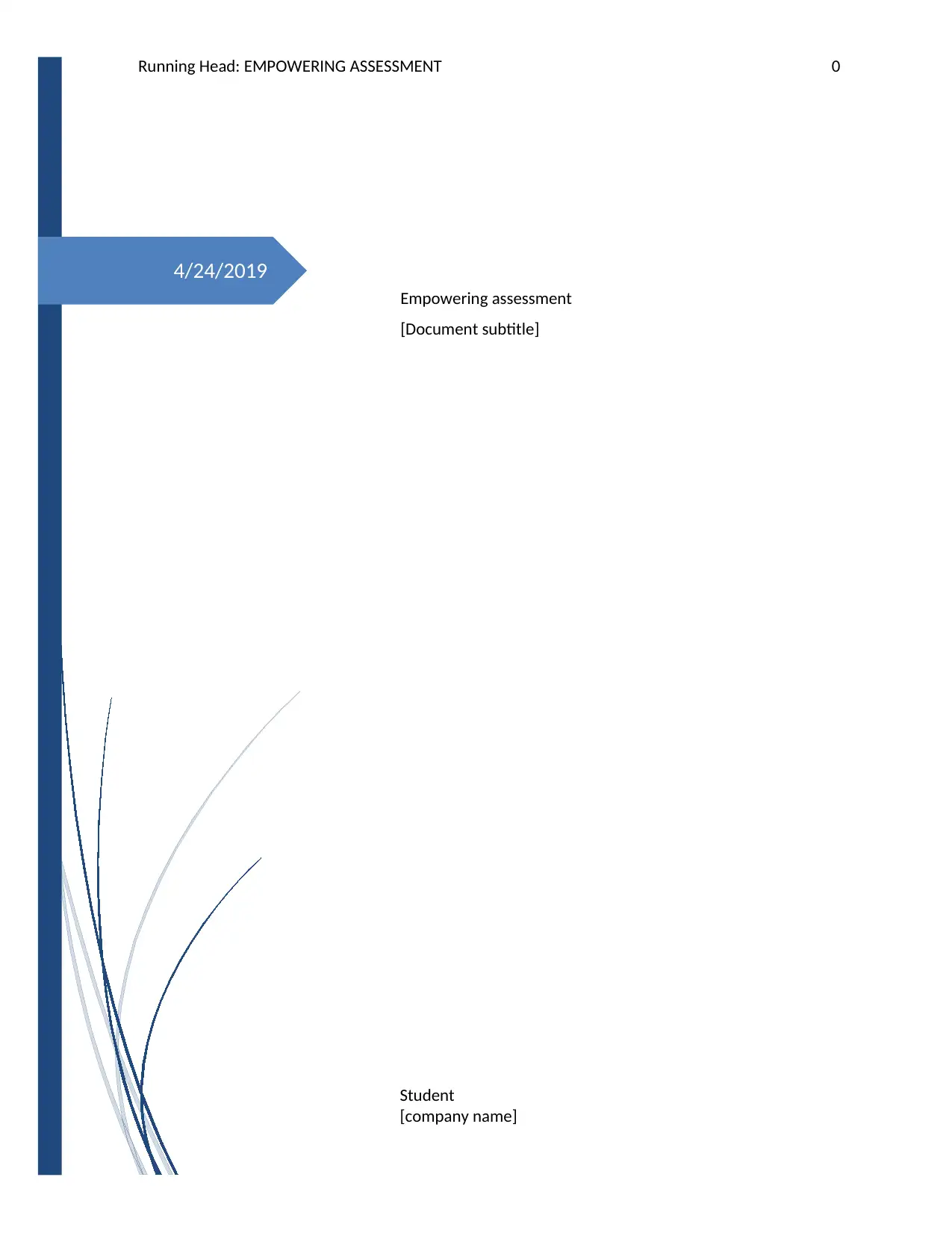
4/24/2019
Running Head: EMPOWERING ASSESSMENT 0
Empowering assessment
[Document subtitle]
Student
[company name]
Running Head: EMPOWERING ASSESSMENT 0
Empowering assessment
[Document subtitle]
Student
[company name]
Paraphrase This Document
Need a fresh take? Get an instant paraphrase of this document with our AI Paraphraser
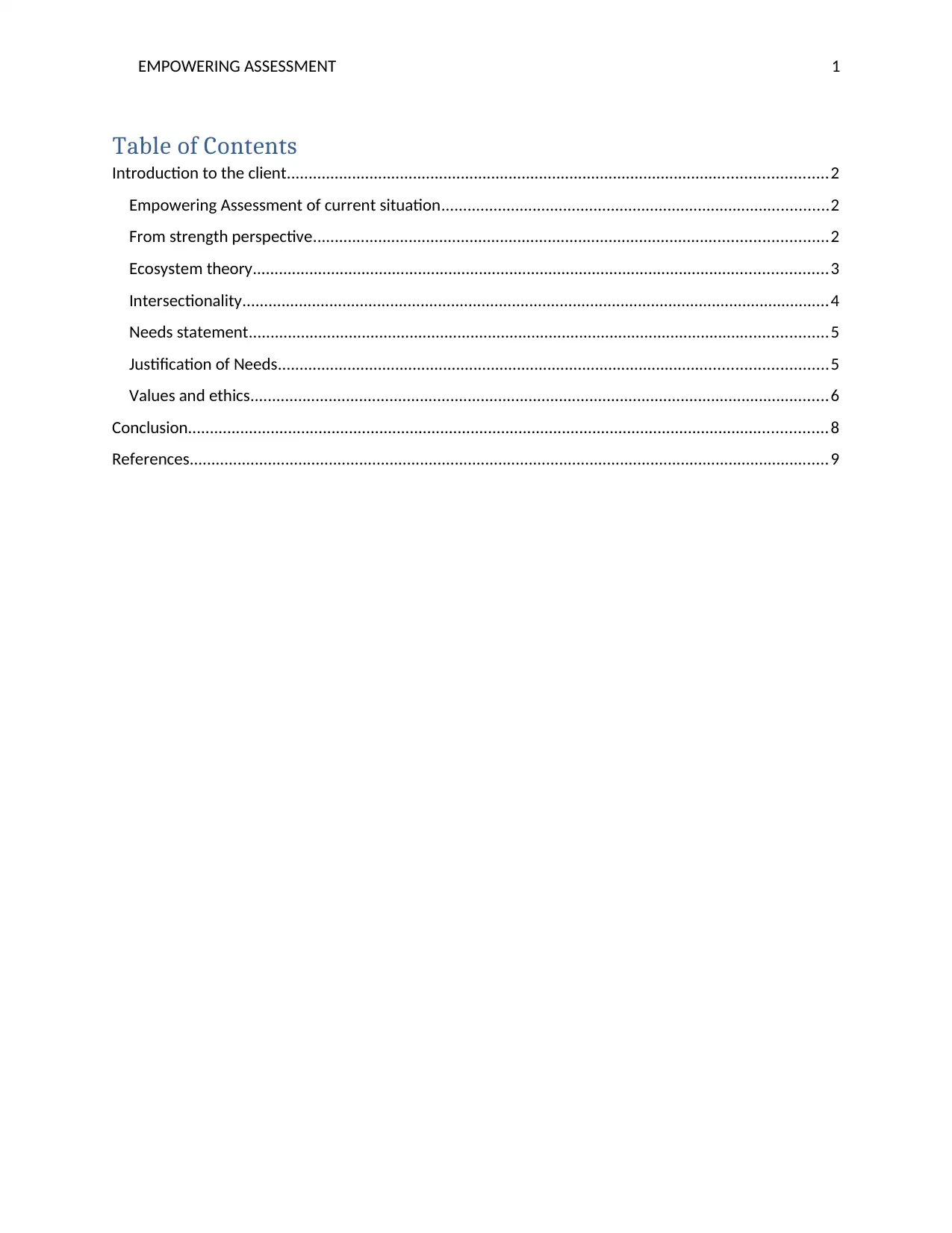
EMPOWERING ASSESSMENT 1
Table of Contents
Introduction to the client............................................................................................................................2
Empowering Assessment of current situation.........................................................................................2
From strength perspective......................................................................................................................2
Ecosystem theory....................................................................................................................................3
Intersectionality.......................................................................................................................................4
Needs statement.....................................................................................................................................5
Justification of Needs..............................................................................................................................5
Values and ethics.....................................................................................................................................6
Conclusion...................................................................................................................................................8
References...................................................................................................................................................9
Table of Contents
Introduction to the client............................................................................................................................2
Empowering Assessment of current situation.........................................................................................2
From strength perspective......................................................................................................................2
Ecosystem theory....................................................................................................................................3
Intersectionality.......................................................................................................................................4
Needs statement.....................................................................................................................................5
Justification of Needs..............................................................................................................................5
Values and ethics.....................................................................................................................................6
Conclusion...................................................................................................................................................8
References...................................................................................................................................................9
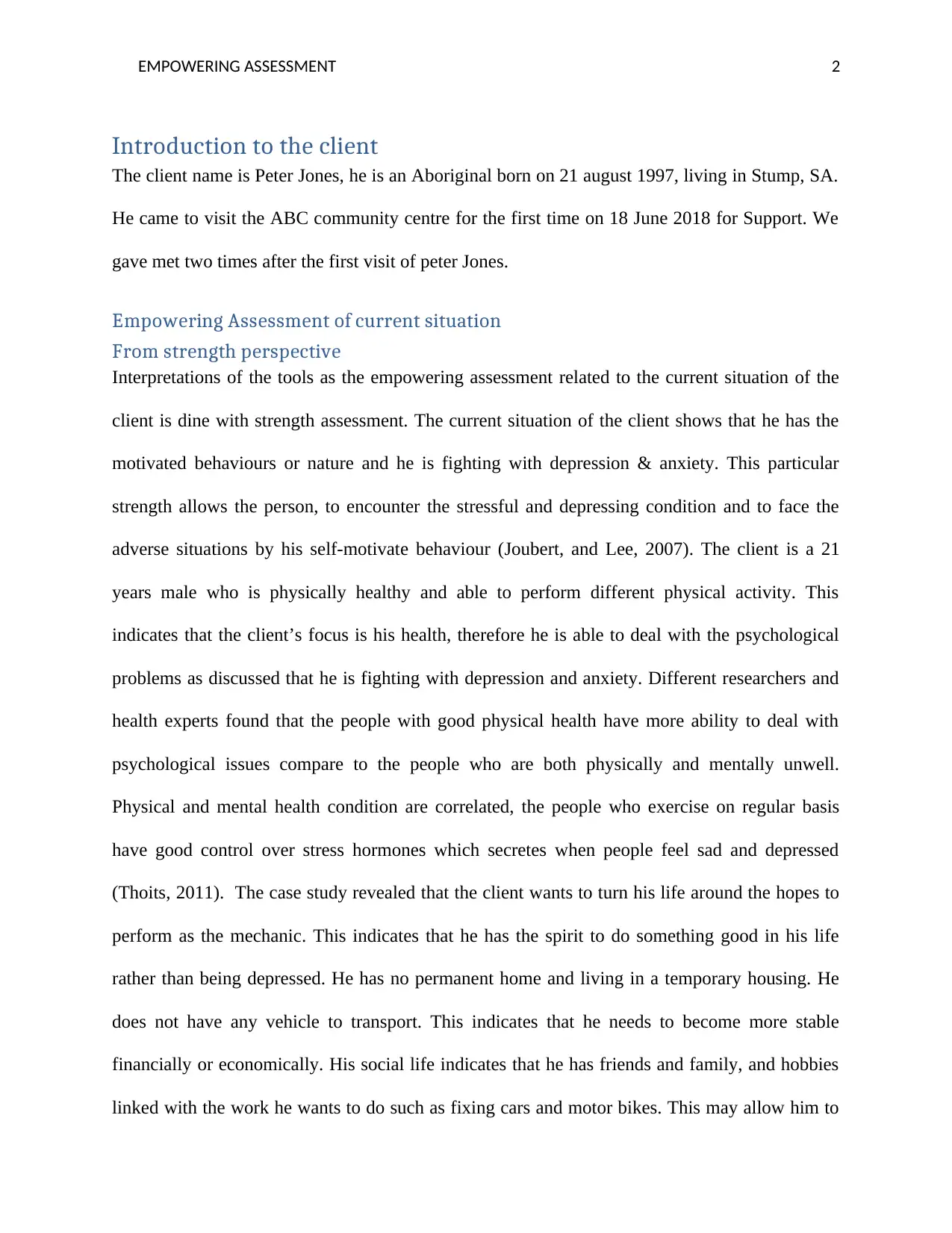
EMPOWERING ASSESSMENT 2
Introduction to the client
The client name is Peter Jones, he is an Aboriginal born on 21 august 1997, living in Stump, SA.
He came to visit the ABC community centre for the first time on 18 June 2018 for Support. We
gave met two times after the first visit of peter Jones.
Empowering Assessment of current situation
From strength perspective
Interpretations of the tools as the empowering assessment related to the current situation of the
client is dine with strength assessment. The current situation of the client shows that he has the
motivated behaviours or nature and he is fighting with depression & anxiety. This particular
strength allows the person, to encounter the stressful and depressing condition and to face the
adverse situations by his self-motivate behaviour (Joubert, and Lee, 2007). The client is a 21
years male who is physically healthy and able to perform different physical activity. This
indicates that the client’s focus is his health, therefore he is able to deal with the psychological
problems as discussed that he is fighting with depression and anxiety. Different researchers and
health experts found that the people with good physical health have more ability to deal with
psychological issues compare to the people who are both physically and mentally unwell.
Physical and mental health condition are correlated, the people who exercise on regular basis
have good control over stress hormones which secretes when people feel sad and depressed
(Thoits, 2011). The case study revealed that the client wants to turn his life around the hopes to
perform as the mechanic. This indicates that he has the spirit to do something good in his life
rather than being depressed. He has no permanent home and living in a temporary housing. He
does not have any vehicle to transport. This indicates that he needs to become more stable
financially or economically. His social life indicates that he has friends and family, and hobbies
linked with the work he wants to do such as fixing cars and motor bikes. This may allow him to
Introduction to the client
The client name is Peter Jones, he is an Aboriginal born on 21 august 1997, living in Stump, SA.
He came to visit the ABC community centre for the first time on 18 June 2018 for Support. We
gave met two times after the first visit of peter Jones.
Empowering Assessment of current situation
From strength perspective
Interpretations of the tools as the empowering assessment related to the current situation of the
client is dine with strength assessment. The current situation of the client shows that he has the
motivated behaviours or nature and he is fighting with depression & anxiety. This particular
strength allows the person, to encounter the stressful and depressing condition and to face the
adverse situations by his self-motivate behaviour (Joubert, and Lee, 2007). The client is a 21
years male who is physically healthy and able to perform different physical activity. This
indicates that the client’s focus is his health, therefore he is able to deal with the psychological
problems as discussed that he is fighting with depression and anxiety. Different researchers and
health experts found that the people with good physical health have more ability to deal with
psychological issues compare to the people who are both physically and mentally unwell.
Physical and mental health condition are correlated, the people who exercise on regular basis
have good control over stress hormones which secretes when people feel sad and depressed
(Thoits, 2011). The case study revealed that the client wants to turn his life around the hopes to
perform as the mechanic. This indicates that he has the spirit to do something good in his life
rather than being depressed. He has no permanent home and living in a temporary housing. He
does not have any vehicle to transport. This indicates that he needs to become more stable
financially or economically. His social life indicates that he has friends and family, and hobbies
linked with the work he wants to do such as fixing cars and motor bikes. This may allow him to
⊘ This is a preview!⊘
Do you want full access?
Subscribe today to unlock all pages.

Trusted by 1+ million students worldwide
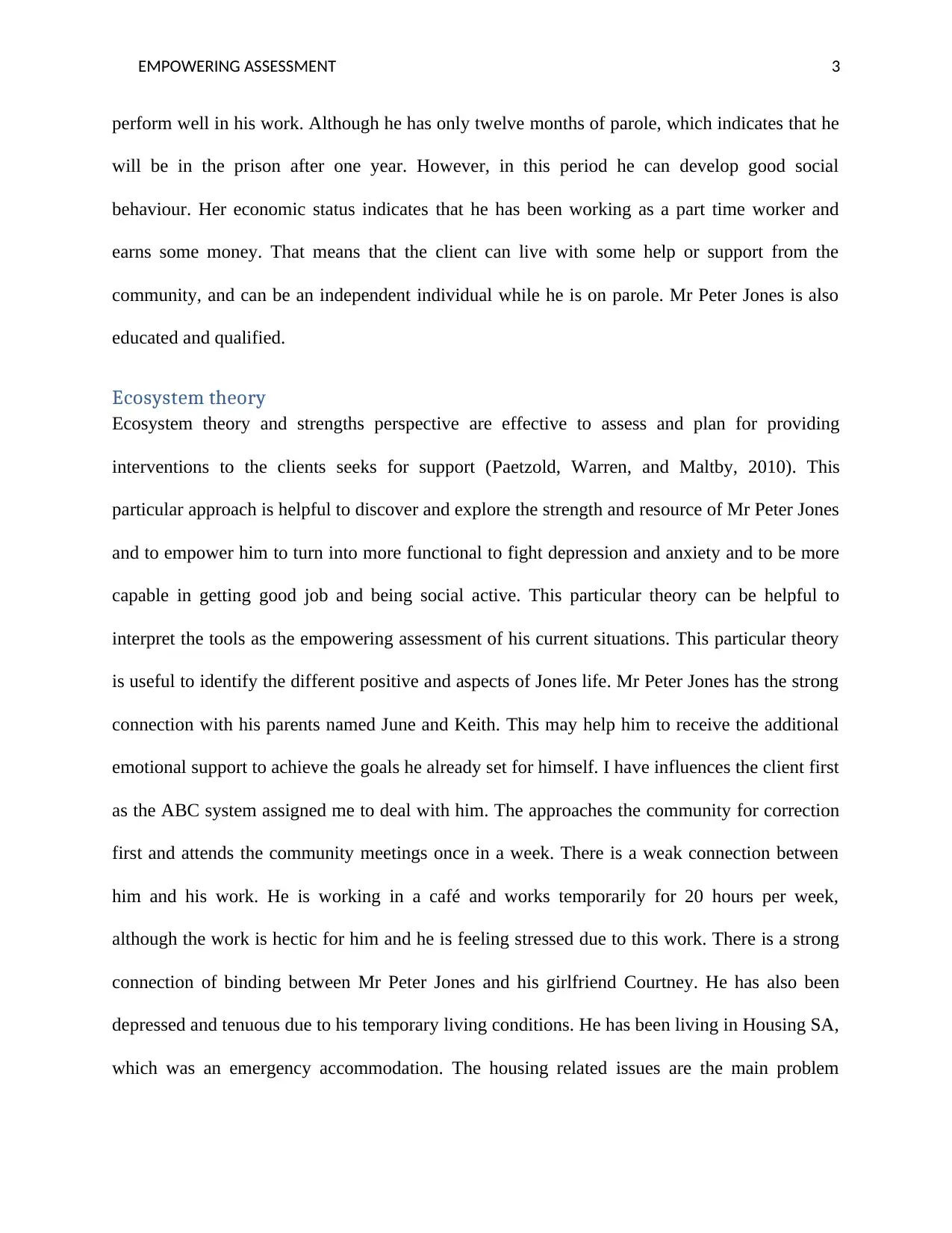
EMPOWERING ASSESSMENT 3
perform well in his work. Although he has only twelve months of parole, which indicates that he
will be in the prison after one year. However, in this period he can develop good social
behaviour. Her economic status indicates that he has been working as a part time worker and
earns some money. That means that the client can live with some help or support from the
community, and can be an independent individual while he is on parole. Mr Peter Jones is also
educated and qualified.
Ecosystem theory
Ecosystem theory and strengths perspective are effective to assess and plan for providing
interventions to the clients seeks for support (Paetzold, Warren, and Maltby, 2010). This
particular approach is helpful to discover and explore the strength and resource of Mr Peter Jones
and to empower him to turn into more functional to fight depression and anxiety and to be more
capable in getting good job and being social active. This particular theory can be helpful to
interpret the tools as the empowering assessment of his current situations. This particular theory
is useful to identify the different positive and aspects of Jones life. Mr Peter Jones has the strong
connection with his parents named June and Keith. This may help him to receive the additional
emotional support to achieve the goals he already set for himself. I have influences the client first
as the ABC system assigned me to deal with him. The approaches the community for correction
first and attends the community meetings once in a week. There is a weak connection between
him and his work. He is working in a café and works temporarily for 20 hours per week,
although the work is hectic for him and he is feeling stressed due to this work. There is a strong
connection of binding between Mr Peter Jones and his girlfriend Courtney. He has also been
depressed and tenuous due to his temporary living conditions. He has been living in Housing SA,
which was an emergency accommodation. The housing related issues are the main problem
perform well in his work. Although he has only twelve months of parole, which indicates that he
will be in the prison after one year. However, in this period he can develop good social
behaviour. Her economic status indicates that he has been working as a part time worker and
earns some money. That means that the client can live with some help or support from the
community, and can be an independent individual while he is on parole. Mr Peter Jones is also
educated and qualified.
Ecosystem theory
Ecosystem theory and strengths perspective are effective to assess and plan for providing
interventions to the clients seeks for support (Paetzold, Warren, and Maltby, 2010). This
particular approach is helpful to discover and explore the strength and resource of Mr Peter Jones
and to empower him to turn into more functional to fight depression and anxiety and to be more
capable in getting good job and being social active. This particular theory can be helpful to
interpret the tools as the empowering assessment of his current situations. This particular theory
is useful to identify the different positive and aspects of Jones life. Mr Peter Jones has the strong
connection with his parents named June and Keith. This may help him to receive the additional
emotional support to achieve the goals he already set for himself. I have influences the client first
as the ABC system assigned me to deal with him. The approaches the community for correction
first and attends the community meetings once in a week. There is a weak connection between
him and his work. He is working in a café and works temporarily for 20 hours per week,
although the work is hectic for him and he is feeling stressed due to this work. There is a strong
connection of binding between Mr Peter Jones and his girlfriend Courtney. He has also been
depressed and tenuous due to his temporary living conditions. He has been living in Housing SA,
which was an emergency accommodation. The housing related issues are the main problem
Paraphrase This Document
Need a fresh take? Get an instant paraphrase of this document with our AI Paraphraser
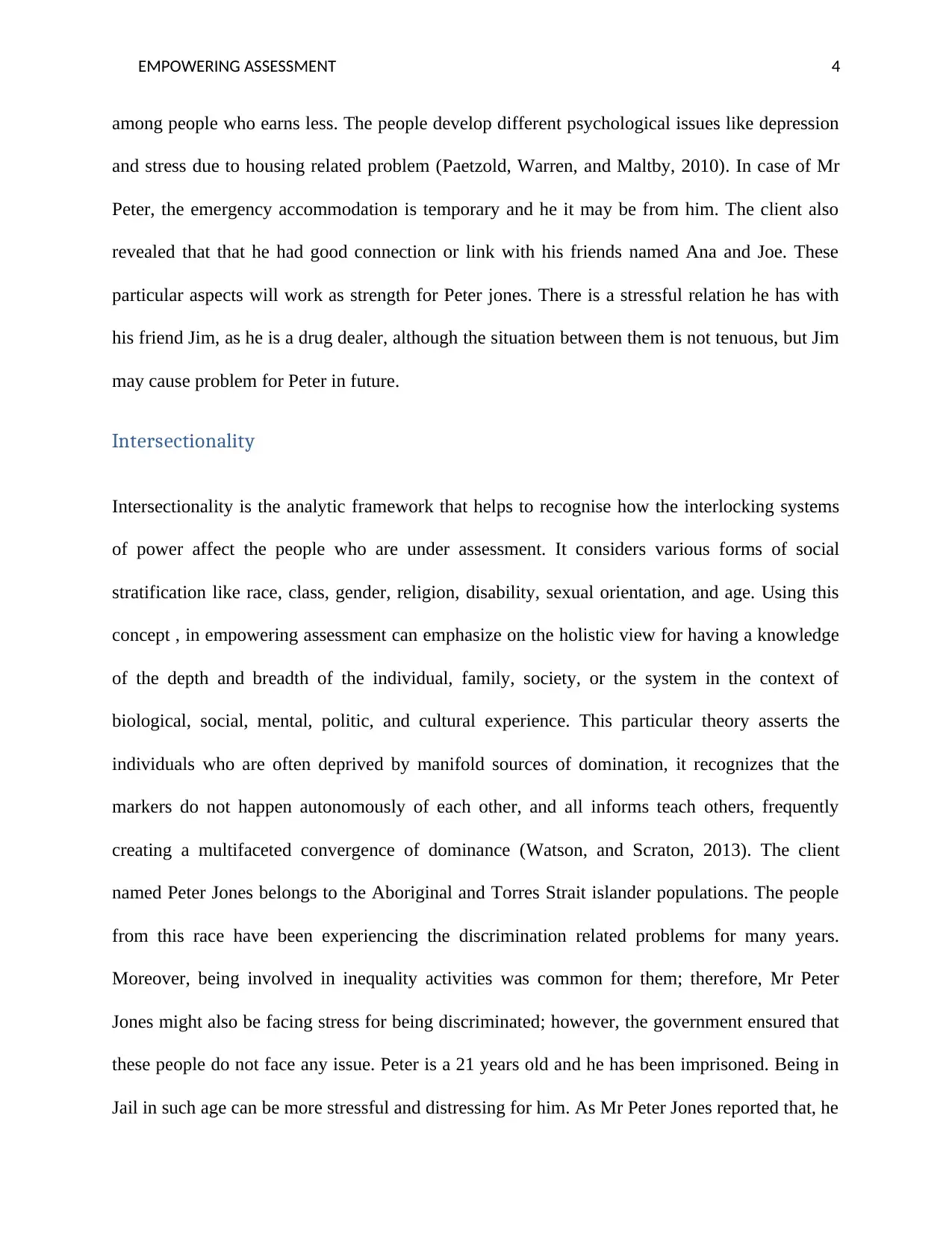
EMPOWERING ASSESSMENT 4
among people who earns less. The people develop different psychological issues like depression
and stress due to housing related problem (Paetzold, Warren, and Maltby, 2010). In case of Mr
Peter, the emergency accommodation is temporary and he it may be from him. The client also
revealed that that he had good connection or link with his friends named Ana and Joe. These
particular aspects will work as strength for Peter jones. There is a stressful relation he has with
his friend Jim, as he is a drug dealer, although the situation between them is not tenuous, but Jim
may cause problem for Peter in future.
Intersectionality
Intersectionality is the analytic framework that helps to recognise how the interlocking systems
of power affect the people who are under assessment. It considers various forms of social
stratification like race, class, gender, religion, disability, sexual orientation, and age. Using this
concept , in empowering assessment can emphasize on the holistic view for having a knowledge
of the depth and breadth of the individual, family, society, or the system in the context of
biological, social, mental, politic, and cultural experience. This particular theory asserts the
individuals who are often deprived by manifold sources of domination, it recognizes that the
markers do not happen autonomously of each other, and all informs teach others, frequently
creating a multifaceted convergence of dominance (Watson, and Scraton, 2013). The client
named Peter Jones belongs to the Aboriginal and Torres Strait islander populations. The people
from this race have been experiencing the discrimination related problems for many years.
Moreover, being involved in inequality activities was common for them; therefore, Mr Peter
Jones might also be facing stress for being discriminated; however, the government ensured that
these people do not face any issue. Peter is a 21 years old and he has been imprisoned. Being in
Jail in such age can be more stressful and distressing for him. As Mr Peter Jones reported that, he
among people who earns less. The people develop different psychological issues like depression
and stress due to housing related problem (Paetzold, Warren, and Maltby, 2010). In case of Mr
Peter, the emergency accommodation is temporary and he it may be from him. The client also
revealed that that he had good connection or link with his friends named Ana and Joe. These
particular aspects will work as strength for Peter jones. There is a stressful relation he has with
his friend Jim, as he is a drug dealer, although the situation between them is not tenuous, but Jim
may cause problem for Peter in future.
Intersectionality
Intersectionality is the analytic framework that helps to recognise how the interlocking systems
of power affect the people who are under assessment. It considers various forms of social
stratification like race, class, gender, religion, disability, sexual orientation, and age. Using this
concept , in empowering assessment can emphasize on the holistic view for having a knowledge
of the depth and breadth of the individual, family, society, or the system in the context of
biological, social, mental, politic, and cultural experience. This particular theory asserts the
individuals who are often deprived by manifold sources of domination, it recognizes that the
markers do not happen autonomously of each other, and all informs teach others, frequently
creating a multifaceted convergence of dominance (Watson, and Scraton, 2013). The client
named Peter Jones belongs to the Aboriginal and Torres Strait islander populations. The people
from this race have been experiencing the discrimination related problems for many years.
Moreover, being involved in inequality activities was common for them; therefore, Mr Peter
Jones might also be facing stress for being discriminated; however, the government ensured that
these people do not face any issue. Peter is a 21 years old and he has been imprisoned. Being in
Jail in such age can be more stressful and distressing for him. As Mr Peter Jones reported that, he
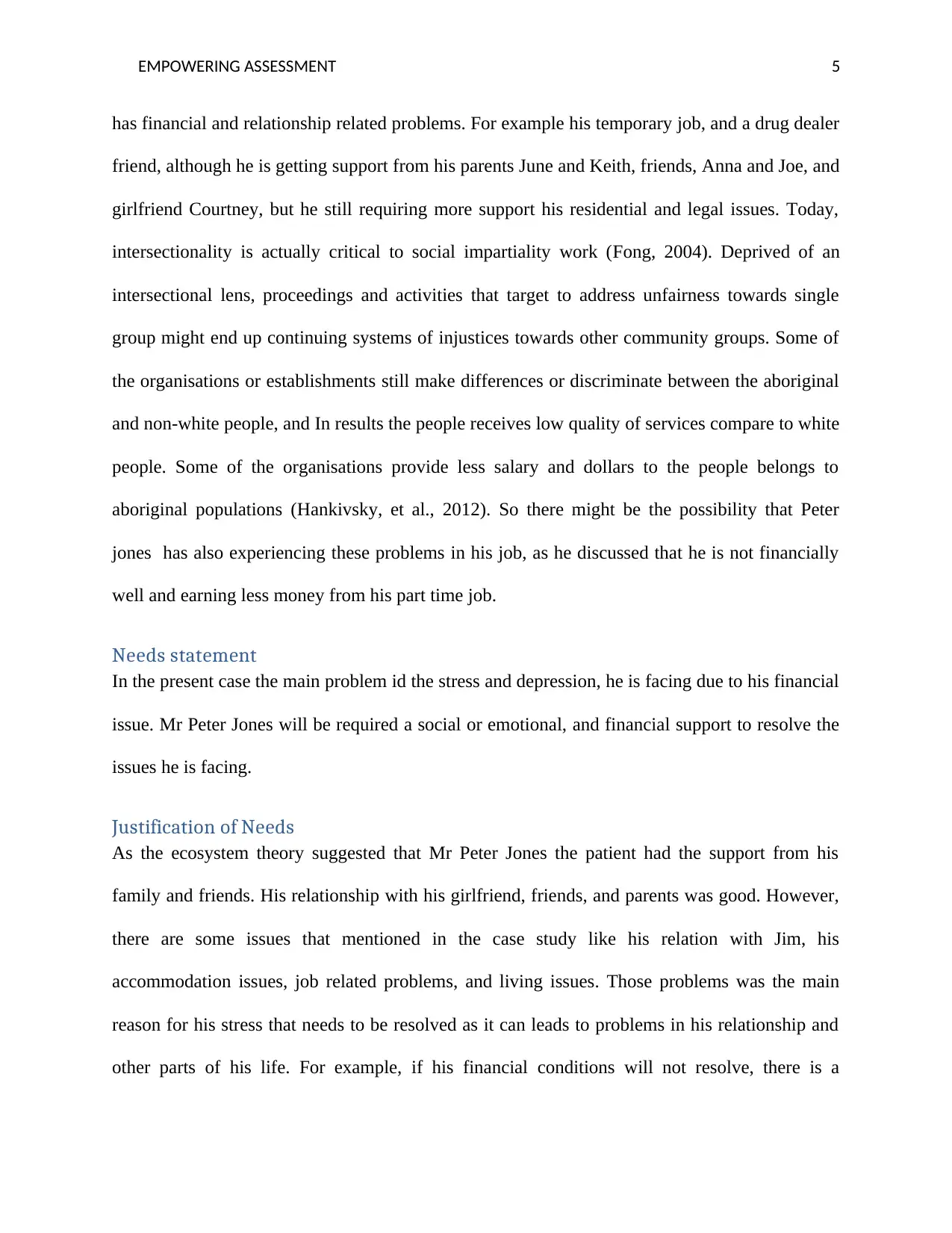
EMPOWERING ASSESSMENT 5
has financial and relationship related problems. For example his temporary job, and a drug dealer
friend, although he is getting support from his parents June and Keith, friends, Anna and Joe, and
girlfriend Courtney, but he still requiring more support his residential and legal issues. Today,
intersectionality is actually critical to social impartiality work (Fong, 2004). Deprived of an
intersectional lens, proceedings and activities that target to address unfairness towards single
group might end up continuing systems of injustices towards other community groups. Some of
the organisations or establishments still make differences or discriminate between the aboriginal
and non-white people, and In results the people receives low quality of services compare to white
people. Some of the organisations provide less salary and dollars to the people belongs to
aboriginal populations (Hankivsky, et al., 2012). So there might be the possibility that Peter
jones has also experiencing these problems in his job, as he discussed that he is not financially
well and earning less money from his part time job.
Needs statement
In the present case the main problem id the stress and depression, he is facing due to his financial
issue. Mr Peter Jones will be required a social or emotional, and financial support to resolve the
issues he is facing.
Justification of Needs
As the ecosystem theory suggested that Mr Peter Jones the patient had the support from his
family and friends. His relationship with his girlfriend, friends, and parents was good. However,
there are some issues that mentioned in the case study like his relation with Jim, his
accommodation issues, job related problems, and living issues. Those problems was the main
reason for his stress that needs to be resolved as it can leads to problems in his relationship and
other parts of his life. For example, if his financial conditions will not resolve, there is a
has financial and relationship related problems. For example his temporary job, and a drug dealer
friend, although he is getting support from his parents June and Keith, friends, Anna and Joe, and
girlfriend Courtney, but he still requiring more support his residential and legal issues. Today,
intersectionality is actually critical to social impartiality work (Fong, 2004). Deprived of an
intersectional lens, proceedings and activities that target to address unfairness towards single
group might end up continuing systems of injustices towards other community groups. Some of
the organisations or establishments still make differences or discriminate between the aboriginal
and non-white people, and In results the people receives low quality of services compare to white
people. Some of the organisations provide less salary and dollars to the people belongs to
aboriginal populations (Hankivsky, et al., 2012). So there might be the possibility that Peter
jones has also experiencing these problems in his job, as he discussed that he is not financially
well and earning less money from his part time job.
Needs statement
In the present case the main problem id the stress and depression, he is facing due to his financial
issue. Mr Peter Jones will be required a social or emotional, and financial support to resolve the
issues he is facing.
Justification of Needs
As the ecosystem theory suggested that Mr Peter Jones the patient had the support from his
family and friends. His relationship with his girlfriend, friends, and parents was good. However,
there are some issues that mentioned in the case study like his relation with Jim, his
accommodation issues, job related problems, and living issues. Those problems was the main
reason for his stress that needs to be resolved as it can leads to problems in his relationship and
other parts of his life. For example, if his financial conditions will not resolve, there is a
⊘ This is a preview!⊘
Do you want full access?
Subscribe today to unlock all pages.

Trusted by 1+ million students worldwide
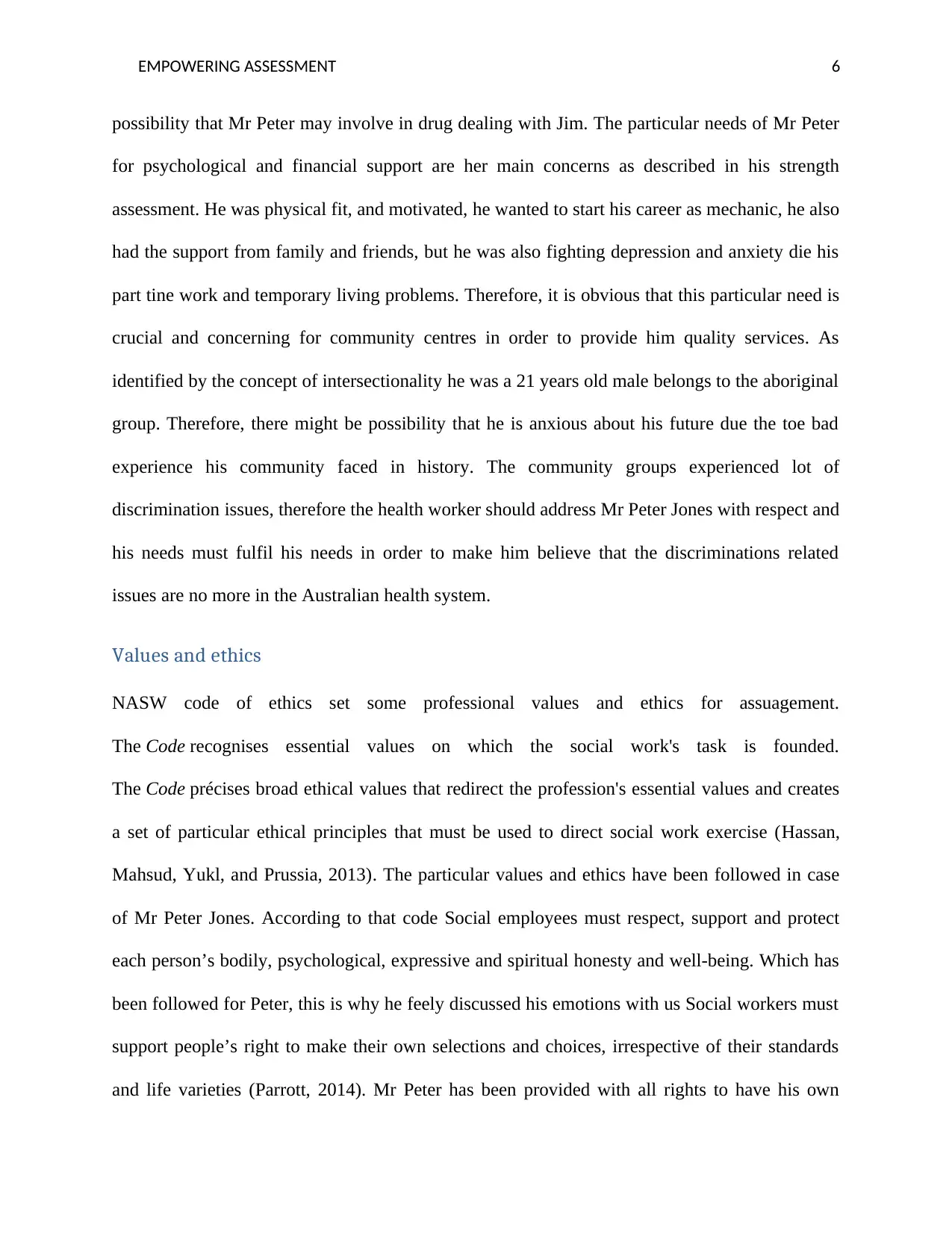
EMPOWERING ASSESSMENT 6
possibility that Mr Peter may involve in drug dealing with Jim. The particular needs of Mr Peter
for psychological and financial support are her main concerns as described in his strength
assessment. He was physical fit, and motivated, he wanted to start his career as mechanic, he also
had the support from family and friends, but he was also fighting depression and anxiety die his
part tine work and temporary living problems. Therefore, it is obvious that this particular need is
crucial and concerning for community centres in order to provide him quality services. As
identified by the concept of intersectionality he was a 21 years old male belongs to the aboriginal
group. Therefore, there might be possibility that he is anxious about his future due the toe bad
experience his community faced in history. The community groups experienced lot of
discrimination issues, therefore the health worker should address Mr Peter Jones with respect and
his needs must fulfil his needs in order to make him believe that the discriminations related
issues are no more in the Australian health system.
Values and ethics
NASW code of ethics set some professional values and ethics for assuagement.
The Code recognises essential values on which the social work's task is founded.
The Code précises broad ethical values that redirect the profession's essential values and creates
a set of particular ethical principles that must be used to direct social work exercise (Hassan,
Mahsud, Yukl, and Prussia, 2013). The particular values and ethics have been followed in case
of Mr Peter Jones. According to that code Social employees must respect, support and protect
each person’s bodily, psychological, expressive and spiritual honesty and well-being. Which has
been followed for Peter, this is why he feely discussed his emotions with us Social workers must
support people’s right to make their own selections and choices, irrespective of their standards
and life varieties (Parrott, 2014). Mr Peter has been provided with all rights to have his own
possibility that Mr Peter may involve in drug dealing with Jim. The particular needs of Mr Peter
for psychological and financial support are her main concerns as described in his strength
assessment. He was physical fit, and motivated, he wanted to start his career as mechanic, he also
had the support from family and friends, but he was also fighting depression and anxiety die his
part tine work and temporary living problems. Therefore, it is obvious that this particular need is
crucial and concerning for community centres in order to provide him quality services. As
identified by the concept of intersectionality he was a 21 years old male belongs to the aboriginal
group. Therefore, there might be possibility that he is anxious about his future due the toe bad
experience his community faced in history. The community groups experienced lot of
discrimination issues, therefore the health worker should address Mr Peter Jones with respect and
his needs must fulfil his needs in order to make him believe that the discriminations related
issues are no more in the Australian health system.
Values and ethics
NASW code of ethics set some professional values and ethics for assuagement.
The Code recognises essential values on which the social work's task is founded.
The Code précises broad ethical values that redirect the profession's essential values and creates
a set of particular ethical principles that must be used to direct social work exercise (Hassan,
Mahsud, Yukl, and Prussia, 2013). The particular values and ethics have been followed in case
of Mr Peter Jones. According to that code Social employees must respect, support and protect
each person’s bodily, psychological, expressive and spiritual honesty and well-being. Which has
been followed for Peter, this is why he feely discussed his emotions with us Social workers must
support people’s right to make their own selections and choices, irrespective of their standards
and life varieties (Parrott, 2014). Mr Peter has been provided with all rights to have his own
Paraphrase This Document
Need a fresh take? Get an instant paraphrase of this document with our AI Paraphraser
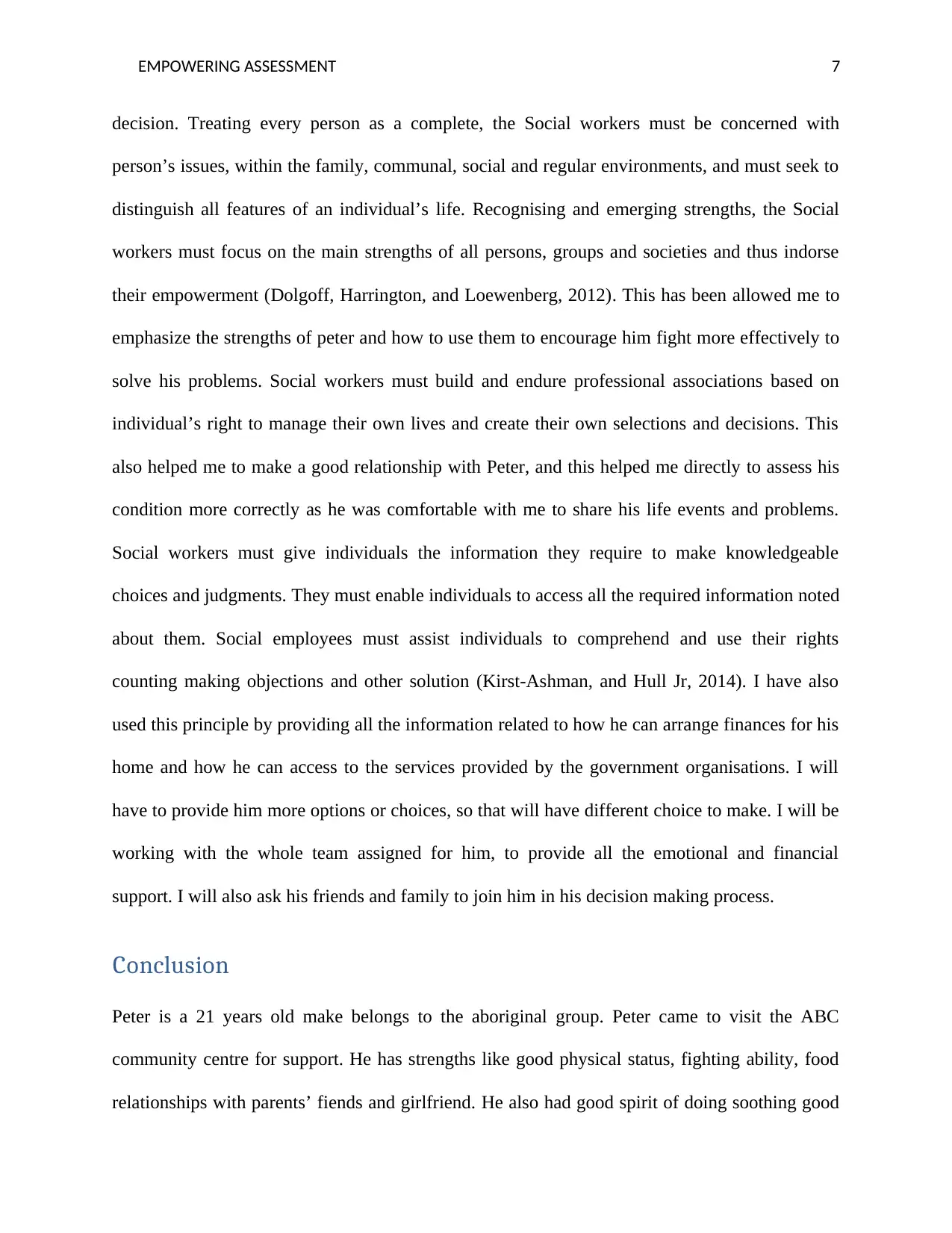
EMPOWERING ASSESSMENT 7
decision. Treating every person as a complete, the Social workers must be concerned with
person’s issues, within the family, communal, social and regular environments, and must seek to
distinguish all features of an individual’s life. Recognising and emerging strengths, the Social
workers must focus on the main strengths of all persons, groups and societies and thus indorse
their empowerment (Dolgoff, Harrington, and Loewenberg, 2012). This has been allowed me to
emphasize the strengths of peter and how to use them to encourage him fight more effectively to
solve his problems. Social workers must build and endure professional associations based on
individual’s right to manage their own lives and create their own selections and decisions. This
also helped me to make a good relationship with Peter, and this helped me directly to assess his
condition more correctly as he was comfortable with me to share his life events and problems.
Social workers must give individuals the information they require to make knowledgeable
choices and judgments. They must enable individuals to access all the required information noted
about them. Social employees must assist individuals to comprehend and use their rights
counting making objections and other solution (Kirst-Ashman, and Hull Jr, 2014). I have also
used this principle by providing all the information related to how he can arrange finances for his
home and how he can access to the services provided by the government organisations. I will
have to provide him more options or choices, so that will have different choice to make. I will be
working with the whole team assigned for him, to provide all the emotional and financial
support. I will also ask his friends and family to join him in his decision making process.
Conclusion
Peter is a 21 years old make belongs to the aboriginal group. Peter came to visit the ABC
community centre for support. He has strengths like good physical status, fighting ability, food
relationships with parents’ fiends and girlfriend. He also had good spirit of doing soothing good
decision. Treating every person as a complete, the Social workers must be concerned with
person’s issues, within the family, communal, social and regular environments, and must seek to
distinguish all features of an individual’s life. Recognising and emerging strengths, the Social
workers must focus on the main strengths of all persons, groups and societies and thus indorse
their empowerment (Dolgoff, Harrington, and Loewenberg, 2012). This has been allowed me to
emphasize the strengths of peter and how to use them to encourage him fight more effectively to
solve his problems. Social workers must build and endure professional associations based on
individual’s right to manage their own lives and create their own selections and decisions. This
also helped me to make a good relationship with Peter, and this helped me directly to assess his
condition more correctly as he was comfortable with me to share his life events and problems.
Social workers must give individuals the information they require to make knowledgeable
choices and judgments. They must enable individuals to access all the required information noted
about them. Social employees must assist individuals to comprehend and use their rights
counting making objections and other solution (Kirst-Ashman, and Hull Jr, 2014). I have also
used this principle by providing all the information related to how he can arrange finances for his
home and how he can access to the services provided by the government organisations. I will
have to provide him more options or choices, so that will have different choice to make. I will be
working with the whole team assigned for him, to provide all the emotional and financial
support. I will also ask his friends and family to join him in his decision making process.
Conclusion
Peter is a 21 years old make belongs to the aboriginal group. Peter came to visit the ABC
community centre for support. He has strengths like good physical status, fighting ability, food
relationships with parents’ fiends and girlfriend. He also had good spirit of doing soothing good
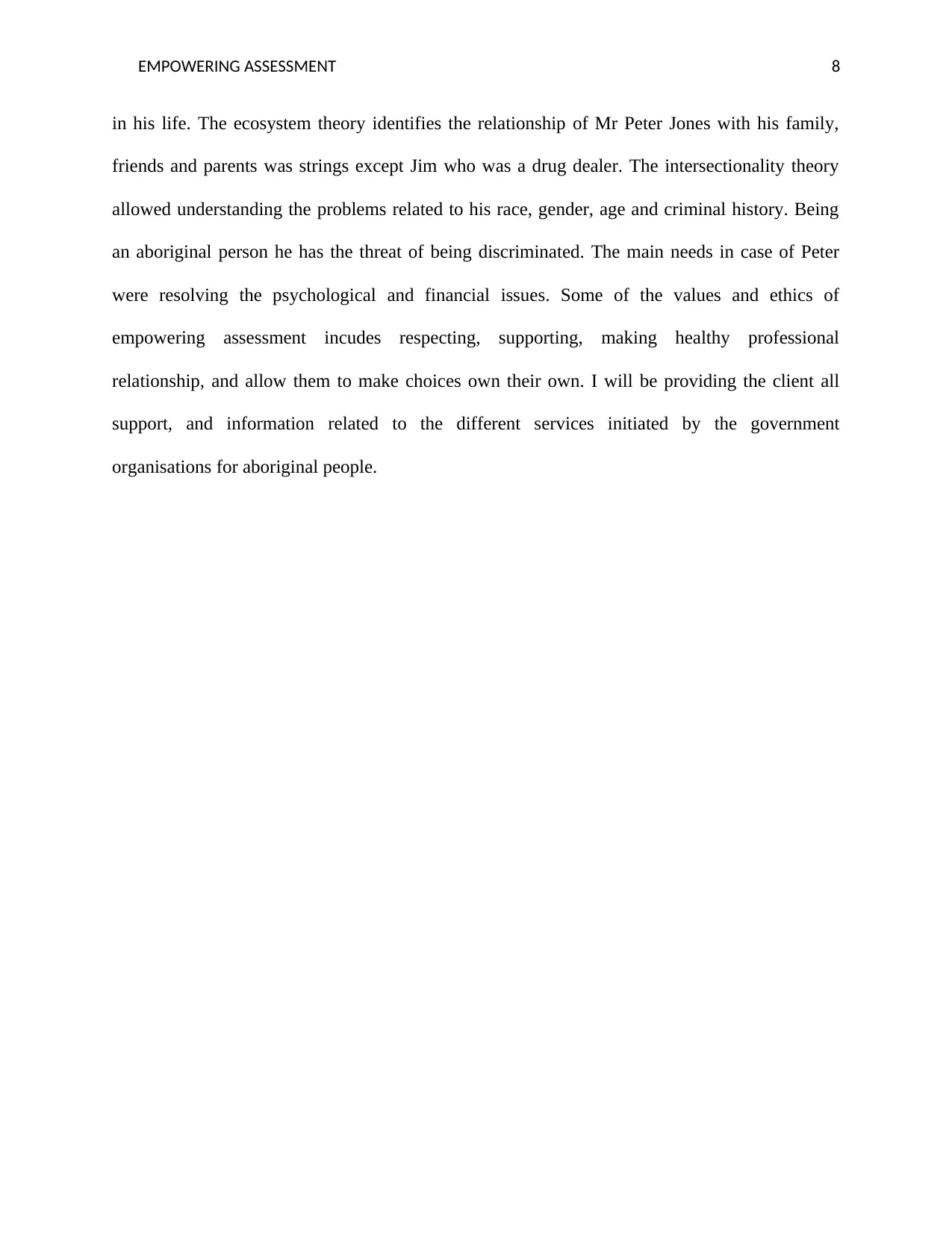
EMPOWERING ASSESSMENT 8
in his life. The ecosystem theory identifies the relationship of Mr Peter Jones with his family,
friends and parents was strings except Jim who was a drug dealer. The intersectionality theory
allowed understanding the problems related to his race, gender, age and criminal history. Being
an aboriginal person he has the threat of being discriminated. The main needs in case of Peter
were resolving the psychological and financial issues. Some of the values and ethics of
empowering assessment incudes respecting, supporting, making healthy professional
relationship, and allow them to make choices own their own. I will be providing the client all
support, and information related to the different services initiated by the government
organisations for aboriginal people.
in his life. The ecosystem theory identifies the relationship of Mr Peter Jones with his family,
friends and parents was strings except Jim who was a drug dealer. The intersectionality theory
allowed understanding the problems related to his race, gender, age and criminal history. Being
an aboriginal person he has the threat of being discriminated. The main needs in case of Peter
were resolving the psychological and financial issues. Some of the values and ethics of
empowering assessment incudes respecting, supporting, making healthy professional
relationship, and allow them to make choices own their own. I will be providing the client all
support, and information related to the different services initiated by the government
organisations for aboriginal people.
⊘ This is a preview!⊘
Do you want full access?
Subscribe today to unlock all pages.

Trusted by 1+ million students worldwide
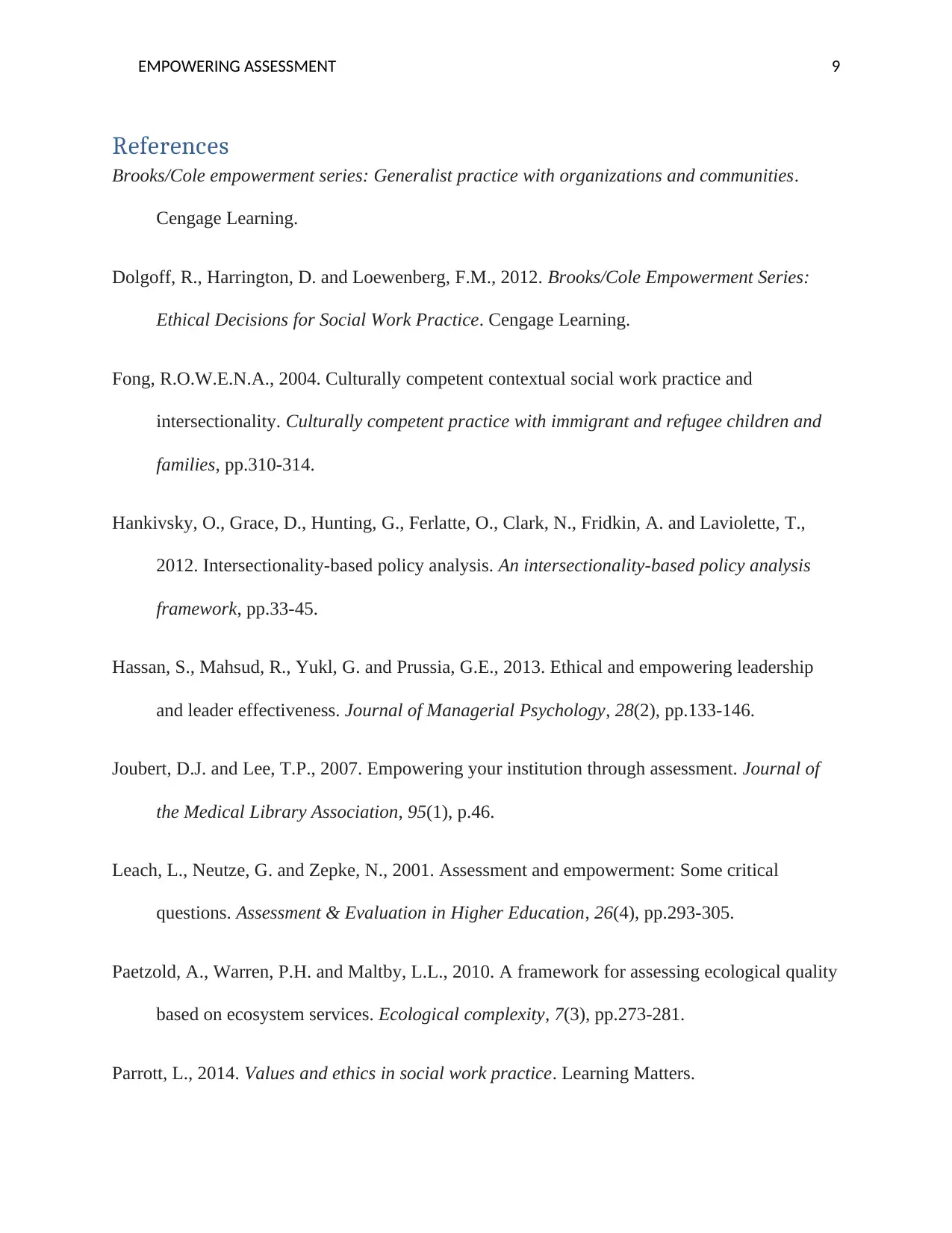
EMPOWERING ASSESSMENT 9
References
Brooks/Cole empowerment series: Generalist practice with organizations and communities.
Cengage Learning.
Dolgoff, R., Harrington, D. and Loewenberg, F.M., 2012. Brooks/Cole Empowerment Series:
Ethical Decisions for Social Work Practice. Cengage Learning.
Fong, R.O.W.E.N.A., 2004. Culturally competent contextual social work practice and
intersectionality. Culturally competent practice with immigrant and refugee children and
families, pp.310-314.
Hankivsky, O., Grace, D., Hunting, G., Ferlatte, O., Clark, N., Fridkin, A. and Laviolette, T.,
2012. Intersectionality-based policy analysis. An intersectionality-based policy analysis
framework, pp.33-45.
Hassan, S., Mahsud, R., Yukl, G. and Prussia, G.E., 2013. Ethical and empowering leadership
and leader effectiveness. Journal of Managerial Psychology, 28(2), pp.133-146.
Joubert, D.J. and Lee, T.P., 2007. Empowering your institution through assessment. Journal of
the Medical Library Association, 95(1), p.46.
Leach, L., Neutze, G. and Zepke, N., 2001. Assessment and empowerment: Some critical
questions. Assessment & Evaluation in Higher Education, 26(4), pp.293-305.
Paetzold, A., Warren, P.H. and Maltby, L.L., 2010. A framework for assessing ecological quality
based on ecosystem services. Ecological complexity, 7(3), pp.273-281.
Parrott, L., 2014. Values and ethics in social work practice. Learning Matters.
References
Brooks/Cole empowerment series: Generalist practice with organizations and communities.
Cengage Learning.
Dolgoff, R., Harrington, D. and Loewenberg, F.M., 2012. Brooks/Cole Empowerment Series:
Ethical Decisions for Social Work Practice. Cengage Learning.
Fong, R.O.W.E.N.A., 2004. Culturally competent contextual social work practice and
intersectionality. Culturally competent practice with immigrant and refugee children and
families, pp.310-314.
Hankivsky, O., Grace, D., Hunting, G., Ferlatte, O., Clark, N., Fridkin, A. and Laviolette, T.,
2012. Intersectionality-based policy analysis. An intersectionality-based policy analysis
framework, pp.33-45.
Hassan, S., Mahsud, R., Yukl, G. and Prussia, G.E., 2013. Ethical and empowering leadership
and leader effectiveness. Journal of Managerial Psychology, 28(2), pp.133-146.
Joubert, D.J. and Lee, T.P., 2007. Empowering your institution through assessment. Journal of
the Medical Library Association, 95(1), p.46.
Leach, L., Neutze, G. and Zepke, N., 2001. Assessment and empowerment: Some critical
questions. Assessment & Evaluation in Higher Education, 26(4), pp.293-305.
Paetzold, A., Warren, P.H. and Maltby, L.L., 2010. A framework for assessing ecological quality
based on ecosystem services. Ecological complexity, 7(3), pp.273-281.
Parrott, L., 2014. Values and ethics in social work practice. Learning Matters.
Paraphrase This Document
Need a fresh take? Get an instant paraphrase of this document with our AI Paraphraser
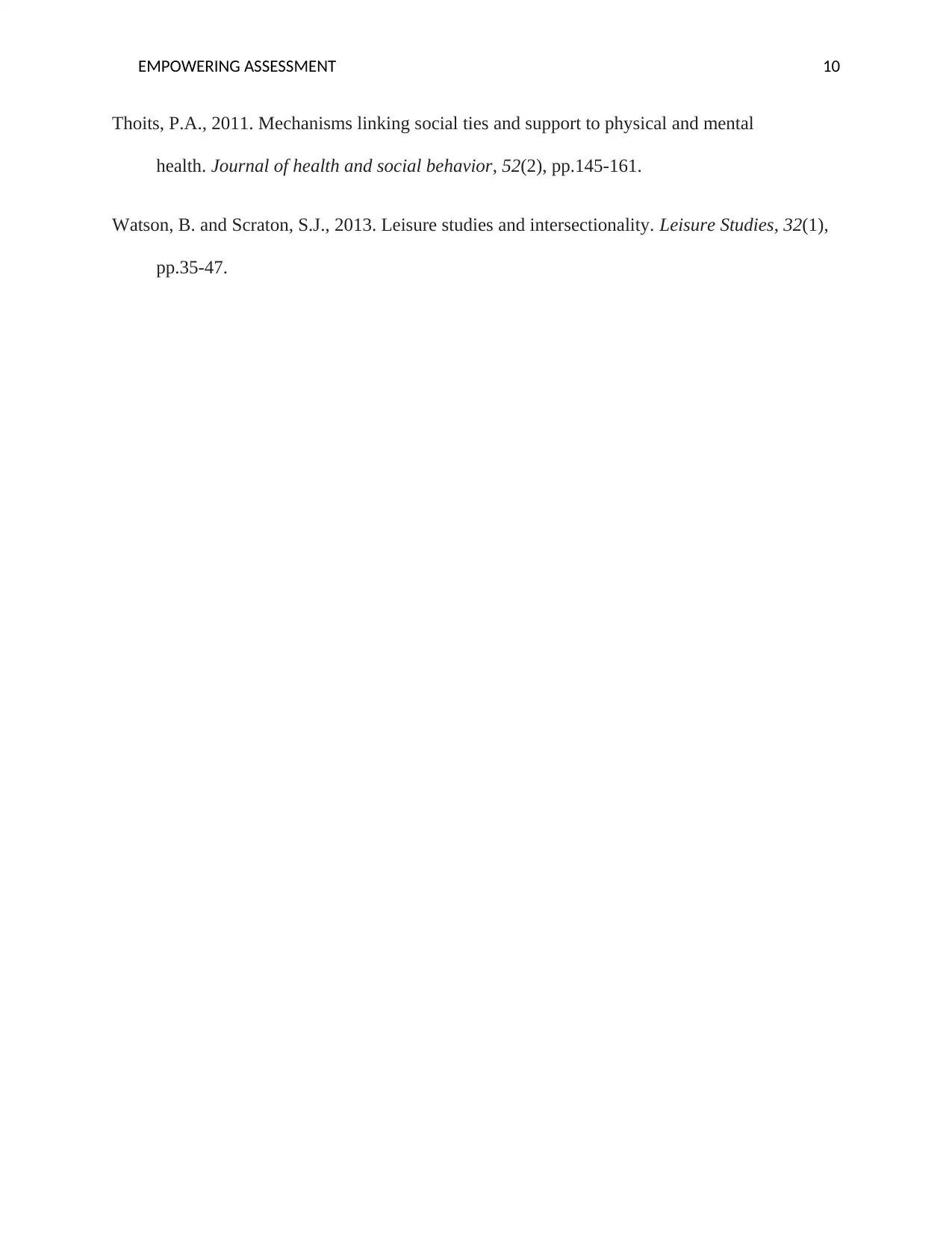
EMPOWERING ASSESSMENT 10
Thoits, P.A., 2011. Mechanisms linking social ties and support to physical and mental
health. Journal of health and social behavior, 52(2), pp.145-161.
Watson, B. and Scraton, S.J., 2013. Leisure studies and intersectionality. Leisure Studies, 32(1),
pp.35-47.
Thoits, P.A., 2011. Mechanisms linking social ties and support to physical and mental
health. Journal of health and social behavior, 52(2), pp.145-161.
Watson, B. and Scraton, S.J., 2013. Leisure studies and intersectionality. Leisure Studies, 32(1),
pp.35-47.
1 out of 11
Related Documents
Your All-in-One AI-Powered Toolkit for Academic Success.
+13062052269
info@desklib.com
Available 24*7 on WhatsApp / Email
![[object Object]](/_next/static/media/star-bottom.7253800d.svg)
Unlock your academic potential
Copyright © 2020–2026 A2Z Services. All Rights Reserved. Developed and managed by ZUCOL.





